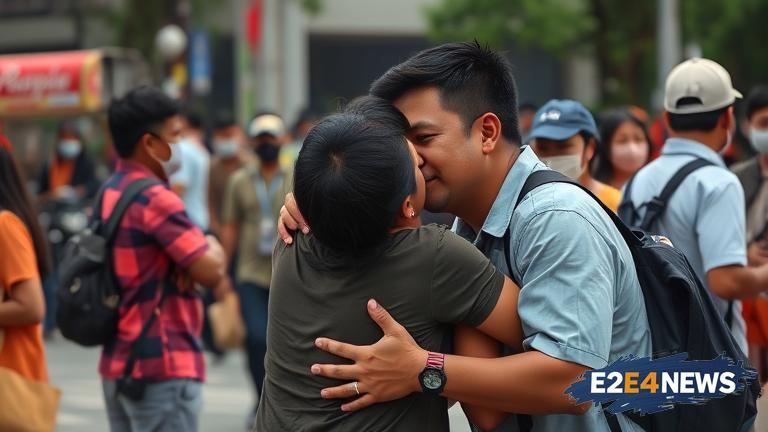In a shocking display of strict adherence to Islamic law, two men in Indonesia were publicly caned for hugging and kissing each other in public. The incident occurred in the city of Banda Aceh, which is known for its conservative laws and strict enforcement of Islamic regulations. The men, who were not identified, were caught on camera by the Sharia police, who were patrolling the area in search of individuals engaging in behavior deemed unacceptable under Islamic law. The men were then arrested and brought before a Sharia court, where they were found guilty of violating the law. As punishment, they were publicly caned, with each man receiving 100 lashes. The caning was carried out in a public square, with a large crowd gathering to witness the punishment. The incident has sparked widespread outrage and condemnation from human rights groups, who argue that the punishment is excessive and violates the men’s human rights. Indonesia has a long history of enforcing strict laws on public affection, with couples often being arrested and punished for holding hands or kissing in public. The country’s Islamic laws are based on the Quran and the Hadith, which prohibit behavior deemed immoral or unacceptable. The laws are enforced by the Sharia police, who are responsible for patrolling the streets and arresting individuals who violate the regulations. The incident has also highlighted the growing trend of conservatism in Indonesia, with many calling for stricter enforcement of Islamic laws. The country’s president, Joko Widodo, has been criticized for not doing enough to protect the rights of minority groups, including the LGBTQ+ community. The incident has sparked a heated debate about the role of Islamic law in Indonesia, with some arguing that it is necessary to maintain social order and others arguing that it is a violation of human rights. The men’s punishment has also been condemned by the international community, with many calling for Indonesia to repeal its strict laws on public affection. The incident is a reminder of the challenges faced by the LGBTQ+ community in Indonesia, who often face discrimination and persecution. The country’s strict laws on public affection are a major concern for human rights groups, who argue that they are a violation of the right to freedom of expression and assembly. The incident has also highlighted the need for greater awareness and education about the importance of human rights and the need to protect minority groups. In recent years, Indonesia has seen a growing trend of conservatism, with many calling for stricter enforcement of Islamic laws. The country’s Islamic laws are based on the Quran and the Hadith, which prohibit behavior deemed immoral or unacceptable. The laws are enforced by the Sharia police, who are responsible for patrolling the streets and arresting individuals who violate the regulations. The incident has sparked widespread outrage and condemnation from human rights groups, who argue that the punishment is excessive and violates the men’s human rights. The men’s punishment is a reminder of the challenges faced by the LGBTQ+ community in Indonesia, who often face discrimination and persecution. The country’s strict laws on public affection are a major concern for human rights groups, who argue that they are a violation of the right to freedom of expression and assembly. The incident has also highlighted the need for greater awareness and education about the importance of human rights and the need to protect minority groups. The international community has condemned the men’s punishment, with many calling for Indonesia to repeal its strict laws on public affection. The incident is a reminder of the importance of protecting human rights and the need to promote tolerance and understanding. The men’s punishment has sparked a heated debate about the role of Islamic law in Indonesia, with some arguing that it is necessary to maintain social order and others arguing that it is a violation of human rights. The incident has also highlighted the need for greater awareness and education about the importance of human rights and the need to protect minority groups. The country’s strict laws on public affection are a major concern for human rights groups, who argue that they are a violation of the right to freedom of expression and assembly. The incident has sparked widespread outrage and condemnation from human rights groups, who argue that the punishment is excessive and violates the men’s human rights.




